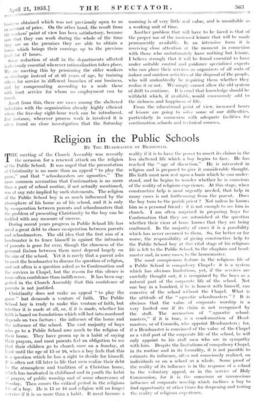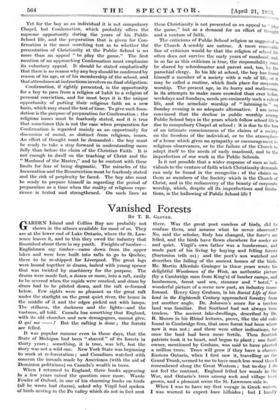Religion in the Public Schools Br THE HEADMASTER OF BRADFIELD.
THE meeting of the Church Assembly was recently the occasion for a renewed attack on the religion of the Public School. It was urged that the presentation of Christianity is no more than an appeal " to play the game," and that " schoolmasters arc agnostics." The inure common accusation that Confirmation is no more than a part of school routine, if not actually mentioned, was at any rate implied by such statements. The religion of the Public School boy is as much influenced by the atmoSphere of • his home as of his school, and it is only by co-operation between parents and schoolmasters that the problem of presenting Christianity to the boy can be tackled with any measure of success.
During recent years progress in Public School life has owed a great debt to closer co-operation between parents and schoolmasters. The old idea that• the first aim of a headmaster is to fence himself in against the intrusion of parents is gone for ever, though the closeness of the personal liaison between them must depend largely on the size of the school. Yet it is rarely that a parent asks to meet the headmaster to discuss the question of religion, and not often is a question asked as to Confirmation and the services in Chapel, but the reason for this silence is more often confidence than indifference. • It has been sug- gested • in the Church Assembly that this confidence of parents is not justified.
Christianity does not make an appeal " to play the game but demands a venture of faith. The Public School boy • is ready to make this venture of faith, but whether it is made at all, or, if it is made, whether his faith is based on foundations which will last into manhood depends on two factors : the influence of the home and the influence of the school. The vast majority of boys who go to a Public School owe much to the religion of their home. They have grown up in a habit of saying their prayers, and most parents feel an obligation to see that their children go to church once on a Sunday, at least until the age of 15 or 16, when a boy feels that this is a question which he has a right to decide for hiMself. It is often not till later in life that men realize their debt to the atmosphere and tradition of a Christian home, which has inculcated in childhood and in youth the habit f'f prayer, of public worship and of some observance of Sunday. Then comes the critical period in the religious life of a boy. He is 15 or 16 and religion will no longer survive if it is no more than a habit. It must become a reality if it is to have the power to assert its claims in the less sheltered life which a boy begins to face. He has reached the " age of discretion." He is interested in religion and is prepared to give it considerable thought.. His faith must now rest upon a basis which he can under- stand, and he begins to wonder whether he is conscious of the reality of religious experience. At this stage, when constructive help is most urgently needed, that help in many cases is not forthcoming from the parent. Does the boy turn to the parish priest ? Not unless he knows him as a personal friend : it is not enough to see hint in church. I am' often surprised in preparing boys for Confirmation that they arc astonished at the question whether their vicar at home knows that they arc being confirmed. In the majority of eases it is a possibility which has never occurred to them. So, for better or for worse, the responsibility of giving constructive help to the Public School boy at this vital stage of his religious life is left to the Public School, to the chaplain and head- master and, in some eases, to the housemaster.
The most conspicuous feature in the religions life of a Public School is compulsory Chapel : it is a system which has obvious limitations, yet, if the services are carefully thought out, it is recognized by the boys as a natural part of the corporate life of the school. Not one boy in a hundred, if he is honest with himself, can conceive of the school without the Chapel. What is the attitude of the " agnostic schoolmasters " ? It is obvious that the value of corporate worship is 'a very limited one if its claim is not recognized by the staff. The accusal ion of " agnostic school- masters," if it is true, is a condemnation of Head- masters, or of Councils, who appoint Headmasters ; for, if a Headmaster is convinced of the value of the Chapel as a vital part of the corporate life of the school, he will only appoint to his staff men who arc in sympathy with him. Despite the limitations of compulsory Chapel, in its routine and in its formality, it is not possible to estimate its influence, often not consciously realized, on individuals or on a school as a whole. Some proof of the reality of its influence is in the response of a school to the voluntary appeal, as in the service of Holy Communion, for it is the conscious or unconscious influence of corporate worship which inclines a boy to find opportunity at other times for deepening and testing the reality of religious experience. Yet for the boy as an individual it is not compulsory Chapel, but Confirmation, which probably offers the supreme opportunity during the years of his Public School life, and the preparation that is given . for Con- firmation is the most searching .test as to whether the presentation of Christianity at the Public School is no more than an appeal " to play the games" = The -first mention of an approaching Confirmation must emphasize its voluntary appeal. It should be stated emphatically that there is no reason why any boy should be confirmed by reason of his age, or of his membership Of the school, and that attendance at instructions involves no final obligation: Confirmation, if rightly presented, is the opportunity for a boy to pass from a religion of habit to a religion of personal conviction, and for most boys it is the unique opportunity of putting their religious faith on a new basis, which may stand the-test of time. To give such foun- dation is the purpose of preparation for Confirmation : the religious issues must be fearlessly stated, and it is true that sometimes this is not the case when preparation for Confirmation is regarded mainly as an opportunity for discussion of moral, as distinct -from religious, issues. An effort of thought must be demanded : the boy must be ready to take a step forward in understanding more fully than before the claim of the Christian Faith. It is not enough to dwell on the teaching of Christ and the " Manhood of the Master," and to be content with these limits for fear of being dogmatic. The miracles of the Incarnation and the Resurrection must be fearlessly stated and the risk of perplexity be faced. The boy also must be ready to prepare himself in regarding the period of preparation as a time when the reality of religious expe- rience is tested and strengthened. On such lines as these Christianity is not presented as an appeal to "play the game," but as a demand for an effort of thought and a venture of faith.
The criticisms of Public School religion as suggested in the Church A Isembly are untrue. A more reasonable line of criticism would_ be that the religion of school life often does not survive the early years of manhood, and; in so far as this criticism is true, the responsibility must be shared by schoolmaster and parent and, too, by the parochial clergy. In his life at school, the boy has found himself a member of a society with a rule of life, or it may be called a routine, which finds- place for corporate worship. The- present age, in its hurry and restlessness, in its attempts to make more -crowded than ever before weekdays and Sundays, needs pre-eminently such a rule of life, and the armchair worship of " " oil Sunday evening is no adequate alternative. -I am never convinced -that the decline in public worship among Public School boys in the years which follow school life is due to compulsory Chapel at school : it is due to the loss of an intimate consciousness of the claims of a society on the freedom of the individual, or to the atmosphere of a home which gives no.sympathy or encouragement to religious observances, or to the failure of the Church to adapt itself to the needs of early manhood, and to the imperfection of our work in the Public Schools.
Is it not possible that a wider response of men as indi- viduals to the venture of faith which Christianity demands can only be found in the recognitio i of the claims on them as members of the Society which is the Church of Christ, and in the rediscovery of the beauty of corporate worship, which, despite all its imperfections and limita- tions, is the hallowing of Public School life ?







































 Previous page
Previous page